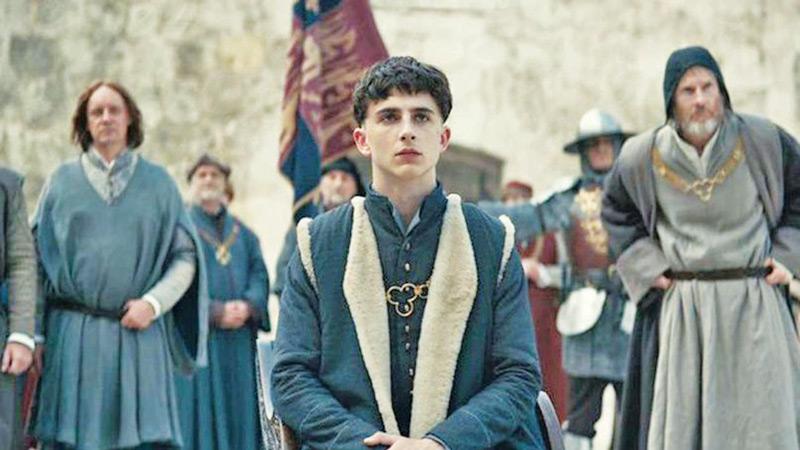
English monarchical history occupies a very significant space in the western film industry. The theme is after all one that has held central ground when it comes to the roots of drama and theatre in Britain, as Shakespeare’s own body of work as playwright contains no less than 10 plays woven around the English monarchy which are classified as ‘history plays’. ‘The King’ is one of the most recent works of cinema based on this theme and looks at the ascent of King Henry V of England as he rises from being the wayward eldest son of King Henry IV, bearing outright disinterest about his position as heir to the throne, to becoming the monarch who unites Britain in a common cause - the invasion of France.
 Written and directed by David Michôd, ‘The King’ has in its lead role Timothée Chalamet as ‘Hal’ the young Prince who would become King Henry V of England. The film shows how the young King, steadfast in his vision of having a peaceful England, cured of its factious infighting between nobles and the crown, is stealthily manoeuvred by his courtiers and the specious William Gascoigne, The Chief Justice of England, played by Sean Harris, who orchestrates events to ensnare young king Henry V into a war with France.
Written and directed by David Michôd, ‘The King’ has in its lead role Timothée Chalamet as ‘Hal’ the young Prince who would become King Henry V of England. The film shows how the young King, steadfast in his vision of having a peaceful England, cured of its factious infighting between nobles and the crown, is stealthily manoeuvred by his courtiers and the specious William Gascoigne, The Chief Justice of England, played by Sean Harris, who orchestrates events to ensnare young king Henry V into a war with France.
The trials and travails of statecraft cast upon the shoulders of a young man who inherits duties undesired, who is compelled to give up the mundane pleasures he revelled in prior to ascending the throne, show how the directorial craft of The King evinces the skill of cinematic portraiture at work in capturing not merely the events that shape the period of Henry V, but also the soul within the character, who gives shape to an era of great change in England. The cinematic craft adopted by Michôd shows a historical drama which isn’t glamorised to grab viewer attention with attractive ‘sensation elements’ that can become out of rhythm with the times the story is set in. Weaving a Mise-en-scène which captures the musty gloom and pallid of a cheerless medieval English royal court, while also delivering the depth of ‘a sober stateliness’, the directorial hand presents what is ingeniously believable as a window to another era.
The script shows a subtle Shakespearean quality in dialogue and had me wondering if the scriptwriter modelled words on the lines of the Bard’s essence of ‘stately narrative’ when giving voice to royal characters in history plays. Interestingly there is commentary online that says The King is based on several history plays of William Shakespeare.
The basis being what is called the ‘Henriad’ which relates to the times of Richard II, Henry IV and Henry V. On the aspect of dialogue in The King and how it may be compared to Shakespeare’s narratives, I came across an interesting online article in New York magazine. Written by Nate Jones, the online article is titled “How The King Rewrites Shakespeare’s Most Famous Dialogue”.
Jones’s piece is a commendable comparative between works across genres and eras. It is an article I would recommend to students of literary and cinematic narratives. The military campaign against France which takes centre stage, brings viewers insights of how English ‘cunning and courage’ combine to achieve strategic objectives. The famed ‘Battle of Agincourt’ where it is shown the English longbow prevails as an advantageous weapon in open field battle over the French crossbow, is depicted in a manner that is memorable.
Young King Henry V’s depth of leadership and substance as a ruler of men who shares a oneness in sentiment of nationhood with his warriors comes out strikingly in his moment of addressing the troops before the charge to engage the French army.
The significance of this battle in the annals of European history is such that it marks the rise of England as one of the most formidable military powers in Europe.
The rise of King Henry V as one of the most respected warrior kings of medieval England is thus brought out memorably in The King in the context of this particular battle scene.
The movie shows finally, how, reconciled with his inescapable duty of leading his nation, where matters of state must be decided not as matters of the heart, the young king solidifies his future path of rule as one who will not be manipulated by devious operators such as Gascoigne. Although a historical drama film, The King is by no means a movie that gives an accurate account of historical events in the manner of a biopic of young Henry V. Events such as the killing of Gascoigne must be treated as fictionalised elements of the ‘dramatic’ since history states Gascoigne’s exit from the royal court was upon resignation from his position.
When taking in the sum total of what it contains, as good acting, believable mood and Mise-en-scène and captivating dialogue, despite whatever divergences the movie has from the strict records of history itself, still as a work in the genre of ‘historical drama film’, ‘The King’, is one that will not, in my opinion, fail to please movie lovers.
